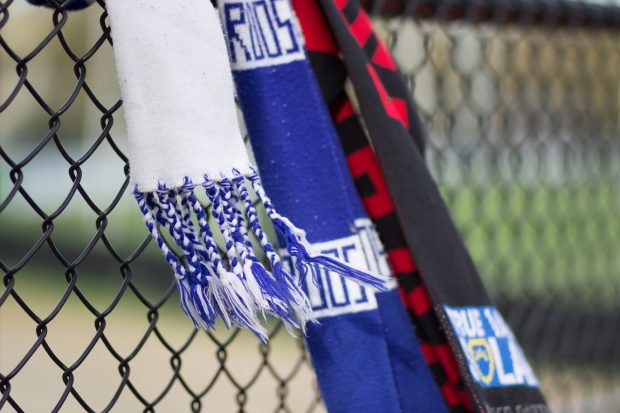On my walk recently I overheard a conversation between three people that went something like this:
“Our club went over to their club to play tennis and then they came over to ours… and afterwards we all got really drunk.”
This made me ponder on why people drink alcohol around sport, and why alcohol and sport (watching or playing) seem to go together.
I have observed, whilst attending professional sports games, that spectators’ emotions are heightened when they are drinking alcohol. For example, when the team they are supporting does well they get really excited and jump up and down, and when the team doesn’t do well they get quite despondent.
Indeed, in New Zealand (where I live) it sometimes seems to me that the psyche of the whole country is affected by whether the All Blacks (rugby) or Black Caps (cricket) win or not.
This effect appears to be exacerbated by alcohol because, in my experience, alcohol can bring a false ‘high’ or ‘feel good’ factor – it is false because your state of being at the time is altered by alcohol.
I well remember that when the effects of alcohol wore off, I came crashing down if the team I was supporting lost (I used to feel quite despondent, especially as I was aware my husband felt down about it), and if my team won, the ‘high’ dissipated fairly quickly because it was never enough to fill the emptiness I felt inside me (which was probably why I needed to drink alcohol or watch sport in the first place)… so I reached for the next drink… and so on…
Why is it that alcohol is so closely associated with sport?
- Is it possible that the sport we play or watch is not enough for us, so that we need something more to ‘have fun’?
- Have we disregarded our bodies so much playing sport that we need something to take away the pain of this disregard?
- Is it perhaps because we think we need a ‘reward’ for playing sport because it is ‘good for us’?
- Are we led to believe it is ‘social’ to drink alcohol while watching, or after playing, sport?
- Are we using alcohol to numb how we are really feeling about sport and avoid feeling the harm it is doing our bodies (if playing), or the obvious great harm it is doing to those professional sportspeople we are watching play? Could this be why many cannot enjoy a game of professional sport without alcohol?
- Have we been hoodwinked by the alcohol manufacturers who sponsor sport and are subconsciously brainwashed by them into thinking alcohol and sport ‘go together’, or that we are ‘supporting’ the sport by drinking it?
And yet the fact is, alcohol is a classified poison that is harmful to our bodies (it is a neuro toxin), and it is a well known fact that it alters our state of being.
Indeed, we can all feel the effect that drinking alcohol has on our body and mind and in my experience this effect is exacerbated by drinking alcohol after playing sport, or even drinking it the night before doing so.
I remember when I used to go for long bike rides on a Sunday morning that if I drank even one small glass of wine the night before, I could feel the effects in my body the next morning: I had less energy and it took me a long time to get going and sometimes I even felt a little nauseous.
I also remember just one small glass of wine going completely ‘to my head’ following a game of squash, so that I became really silly. And yet many of us went to the bar and had an alcoholic drink after playing interclub (competitive) squash. For me, it was sort of expected – indeed, as members we had to take it in turns to man the bar at our squash club.
I remember some of the men staying all evening and then driving home drunk – of course the drink-drive limits weren’t as strict then or policed as well as they are now.
So why is it that we still drink alcohol around sport when we clearly feel these consequences? Perhaps it’s because many of us do it, including many professional sportspeople, and therefore we perceive it as ‘normal’?
But what if we were to ponder on the real and true reason we need to drink alcohol whilst watching or playing sport? For me there was an element of having a glass of wine to fit in with the others in my team, so I would be liked. I know others drank as a reward for a hard game, or as a ‘celebration’ for winning or ‘consolation’ for losing.
But could the underlying reason be that we drink alcohol either to stop us from feeling our emptiness or as an attempt to fill the emptiness we feel inside?
For example, why did I have the need to fit in – to be liked? Answer: because I did not feel good enough about myself, which left me with an empty feeling that I looked for someone else to fill. Another person may play sport and/or drink alcohol to cover up the numbness they feel inside, i.e. to not feel the emptiness, or to avoid being rejected by others by seeking their approval.
It is only when we understand why it is we keep choosing a certain behaviour that we want to, and can start to, make true changes.
Indeed, I have found that being truly honest with myself is the only way I can change my behaviours. For example, I stopped drinking alcohol because I didn’t like how I acted when drinking it – I turned into someone else, and I did not like that ‘other person’.
I had known this for a long time, but it was not until I pondered on why it was I chose a substance that I knew would alter me that I was able to (very easily) give it up. You see, in truth I had never enjoyed drinking alcohol. What I realised was that I drank it either because I wanted to ‘fit in’ and be liked (especially in a sport situation), or because I was not feeling confident in certain situations. Once I had this understanding, quite simply, I no longer needed it.
Bringing honesty to our behaviours makes sense, for once we understand why it is we do something, we can more easily let it go.
By Anne Scott, accredited Mediator, Yoga Teacher, Exercise Instructor and Esoteric Healing Practitioner, Auckland, New Zealand
Further Reading:
Healing my Exercise Addiction and Adrenal Exhaustion
Shopper Dockets & Alcohol Abuse – Is There Such A Thing As Responsible Service of Alcohol?
What is addiction and why do we become addicted?





